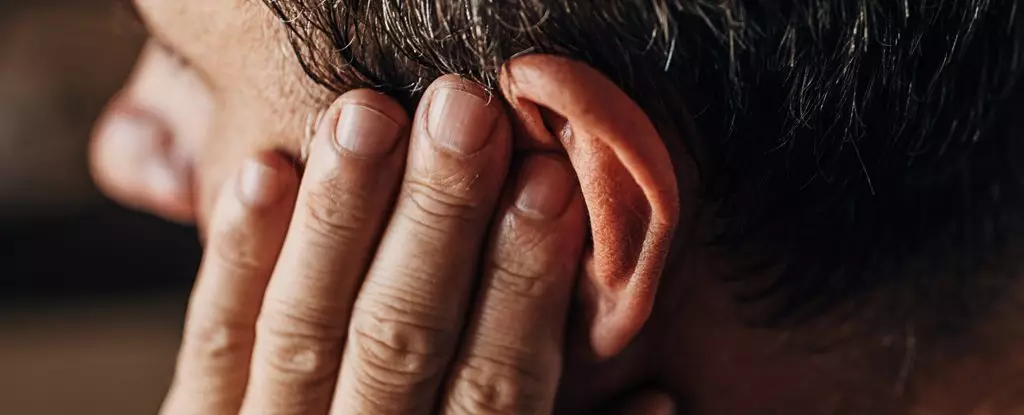Tinnitus, a condition affecting nearly 15 percent of the global population, manifests as a persistent sensation of sound without any audible external source. Patients often describe experiences of ringing, buzzing, or hissing in their ears. This phenomenon is not merely an auditory inconvenience; it’s deeply intertwined with various psychological ramifications. Many individuals endure intense frustration, anxiety, and even depression resulting from prolonged exposure to these phantom sounds—especially over months or years without any relief. Currently, the absence of a definitive cure places a heightened need on finding effective management strategies that could alleviate symptoms for millions worldwide.
Understanding the nature of tinnitus requires examining brain mechanisms and their relationship to sensory perception. Specifically, tinnitus is recognized as a ‘phantom percept’—a scenario where the brain generates perceptions that do not correspond to external stimuli. Most commonly, individuals experience phantom perceptions during sleep. However, for those with tinnitus, their condition presents these distortions while they are awake, causing excessive activity in specific auditory centers of the brain. As recent studies reveal, this increased brain activity might illuminate why individuals suffer from tinnitus and the resultant impact on their overall sleep quality.
The interplay between tinnitus and sleep is an area ripe for exploration. Notably, our sleep architecture consists of various stages; one of the most crucial is slow-wave sleep (SWS), often regarded as deep sleep. This phase is essential for brain regeneration, memory consolidation, and overall well-being. During SWS, there are unique predictable patterns of neuronal activity that enable large brain areas to synchronize, bolstering recovery and enhancing cognitive functions. However, certain areas of the brain may display hyperactivity during this restorative stage, a phenomenon seen not only in sleep disorders but potentially also in individuals suffering from tinnitus.
For many afflicted with tinnitus, sleep disturbances are common, leading to a higher prevalence of nightmares and frequent awakenings. The overactivity of brain regions responsible for processing sound during sleep seems to disrupt these critical restorative functions. Thus, tinnitus may prevent the necessary deep sleep, which contributes to overall poor sleep quality characterized by prolonged light sleep instead. This ongoing battle between tinnitus and sleep creates a vicious cycle where disturbed sleep further exacerbates the symptoms of tinnitus.
Despite these challenges, emerging research suggests that some deep sleep may remain unaffected by tinnitus. This paradox is intriguing; it raises questions about how the brain can utilize slow-wave sleep to mitigate the effects of tinnitus. During periods of deep sleep, the collective neuron activity can lead to a brain state that intermittently suppresses the ringing or buzzing sounds experienced by those with tinnitus. Understanding how these mechanisms operate may be indispensable in developing treatment protocols and strategies to improve the lives of tinnitus sufferers.
It has been posited that the brain’s neuronal responses shift into slow-wave activity after prolonged wakefulness, ultimately creating a neural environment conducive to sleep induction. Such interactions might provide insight into why individuals with tinnitus can occasionally achieve deep sleep, despite the presence of their condition. This raises the possibility of using sleep-enhancing techniques to dampen tinnitus symptoms actively. Strategies like sleep restriction paradigms—encouraging patients to only sleep when fatigued—might improve sleep quality and facilitate greater occurrences of deep sleep.
The notion of studying sleep in conjunction with tinnitus potentially opens new avenues for understanding and treatment. Future research endeavors should involve monitoring sleep stages alongside brain activity patterns in tinnitus patients, providing real-time insights into how sleep may influence tinnitus intensity. Since sleep stages such as rapid eye movement (REM) also play unique roles in cognitive functioning, further exploration into the distinct interactions between these phases and tinnitus may lead to innovative therapies.
Comprehending the complex relationship between sleep and tinnitus is crucial for both research communities and healthcare providers. With over a billion people grappling with the distress of tinnitus, a multifaceted approach combining sleep studies and neurological research might pave the way for groundbreaking therapeutic approaches. Through the integration of these disciplines, we may ultimately unlock the potential for improved management strategies to alleviate the burdens faced by millions suffering from this perplexing auditory condition.


Leave a Reply